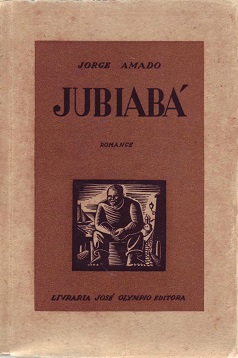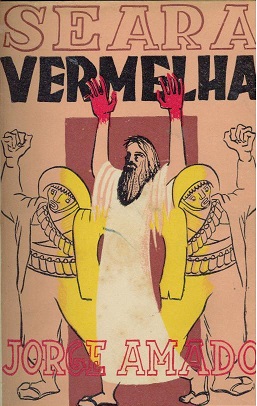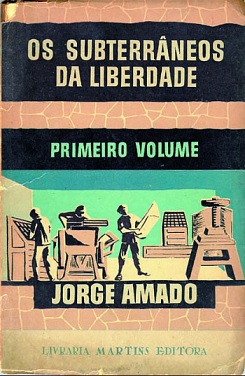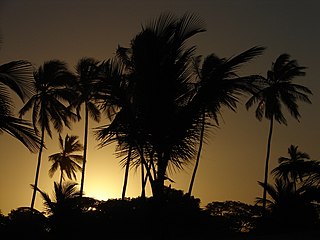
Jorge Leal Amado de Faria was a Brazilian writer of the modernist school. He remains the best known of modern Brazilian writers, with his work having been translated into some 49 languages and popularized in film, notably Dona Flor and Her Two Husbands in 1976. His work reflects the image of a Mestiço Brazil and is marked by religious syncretism. He depicted a cheerful and optimistic country that was beset, at the same time, with deep social and economic differences.

Mexican literature is one of the most prolific and influential of Spanish-language literatures along with those of Spain and Argentina. Found among the names of its most important and internationally recognized literary figures are authors Octavio Paz, Alfonso Reyes, Carlos Fuentes, Sergio Pitol, José Emilio Pacheco, Rosario Castellanos, Fernando del Paso, Juan Rulfo, Amado Nervo, Sor Juana Inés de la Cruz, Ramón López Velarde, and Carlos de Sigüenza y Góngora, among others.

The Country of Carnival is a Brazilian novel. It was written by Jorge Amado in 1931. In this debut novel, the themes that would come to permeate the author's work can already be seen, albeit in an embryonic form. The book is an account of the typical Brazilian intelligentsia of the 1920s. It has not been translated into English.

Cacau is Brazilian Social Realism novel written by Jorge Amado.

Jubiabá is a Brazilian modernist novel written by Jorge Amado in 1935. It earned Amado an international reputation, being hailed by Albert Camus as “a magnificent and haunting” book.

Sea of Death is a Brazilian Modernist novel written by Jorge Amado. Amado wrote the novel in response to his first arrest for "being a communist". The novel follows the lives of poor sailors around Bahia, and their relationship with the Afro-Brazilian religion Candomblé, especially the sea goddess Iemanjá. The novel's style and themes include many traits that characterize Amado's later work.

Captains of the Sands is a Brazilian novel written by Jorge Amado in 1937.

The Violent Land is a Brazilian Modernist novel written by Jorge Amado in 1943 and published in English in 1945. It describes the battles to develop cacao plantations in the forests of the Bahia state of Brazil. Amado wrote that "No other of my books.. . is as dear to me as The Violent Land, in it lie my roots; it is from the blood from which I was created; it contains the gunfire that resounded during my early infancy", and suggested that the novel belongs to a distinct Brazilian "literature of cacao". By 1965, the book had been adapted as a film, as well as for the stage, television and radio.

Red Field is a Brazilian Modernist novel. It was written by Jorge Amado. It has not been published in English.

The Bowels of Liberty is a trilogy of Brazilian Modernist novels written by Jorge Amado in 1954. The trilogy comprises Bitter Times, Agony of Night and Light at the End of the Tunnel.

Dona Flor and Her Two Husbands is a fantasy novel by Brazilian writer Jorge Amado, published in 1966; it was translated into English by Harriet de Onís in 1969. The novel was adapted for the first time into the 1976 film Dona Flor and Her Two Husbands.

Tent of Miracles is a Brazilian Modernist novel. It was written by Jorge Amado in 1967 and published the following year. It was later adapted to a 1977 Cinema Novo film by director/screenplay writer Nelson Pereira dos Santos.

Tereza Batista: Home from the Wars is a Brazilian modernist novel. It was written by Jorge Amado in 1972 and was published in English in 1975, with a translation by Barbara Shelby.

Pen, Sword, Camisole is a Brazilian Modernist novel. It was written by Jorge Amado in 1979. It was published in English in 1985, with a translation by Helen R. Lane.

Showdown is a Brazilian Modernist novel. It was written by Jorge Amado in 1984.
Gregory Rabassa, ComM, was an American literary translator from Spanish and Portuguese to English. He taught for many years at Columbia University and Queens College.

Graciliano Ramos de Oliveira was a Brazilian modernist writer, politician and journalist. He is known worldwide for his portrayal of the precarious situation of the poor inhabitants of the Brazilian sertão in his novel Vidas secas. His characters are complex, nuanced, and tend to have pessimistic world views, from which Ramos deals with topics such as the lust for power, misogyny, and infidelity. His protagonists are mostly lower-class men from northeastern Brazil, which are often aspiring writers, or illiterate country workers, all of which usually have to deal with poverty and complex social relations.

Ilhéus is a major city located in the southern coastal region of Bahia, Brazil, 211 km south of Salvador, the state's capital. The city was founded in 1534 as Vila de São Jorge dos Ilhéus and is known as one of the most important tourism centers of the northeast of Brazil.
Zélia Gattai Amado de Faria was a Brazilian photographer, memoirist, novelist and author of children's literature, as well as a member of the Brazilian Academy of Letters. Gattai wrote 14 different literary works, including children's books and her own personal memoirs have been widely published.

Home Is the Sailor is a Brazilian modernist novel. It was written by Jorge Amado in 1961, and translated into English by Harriet de Onís in 1964.

















